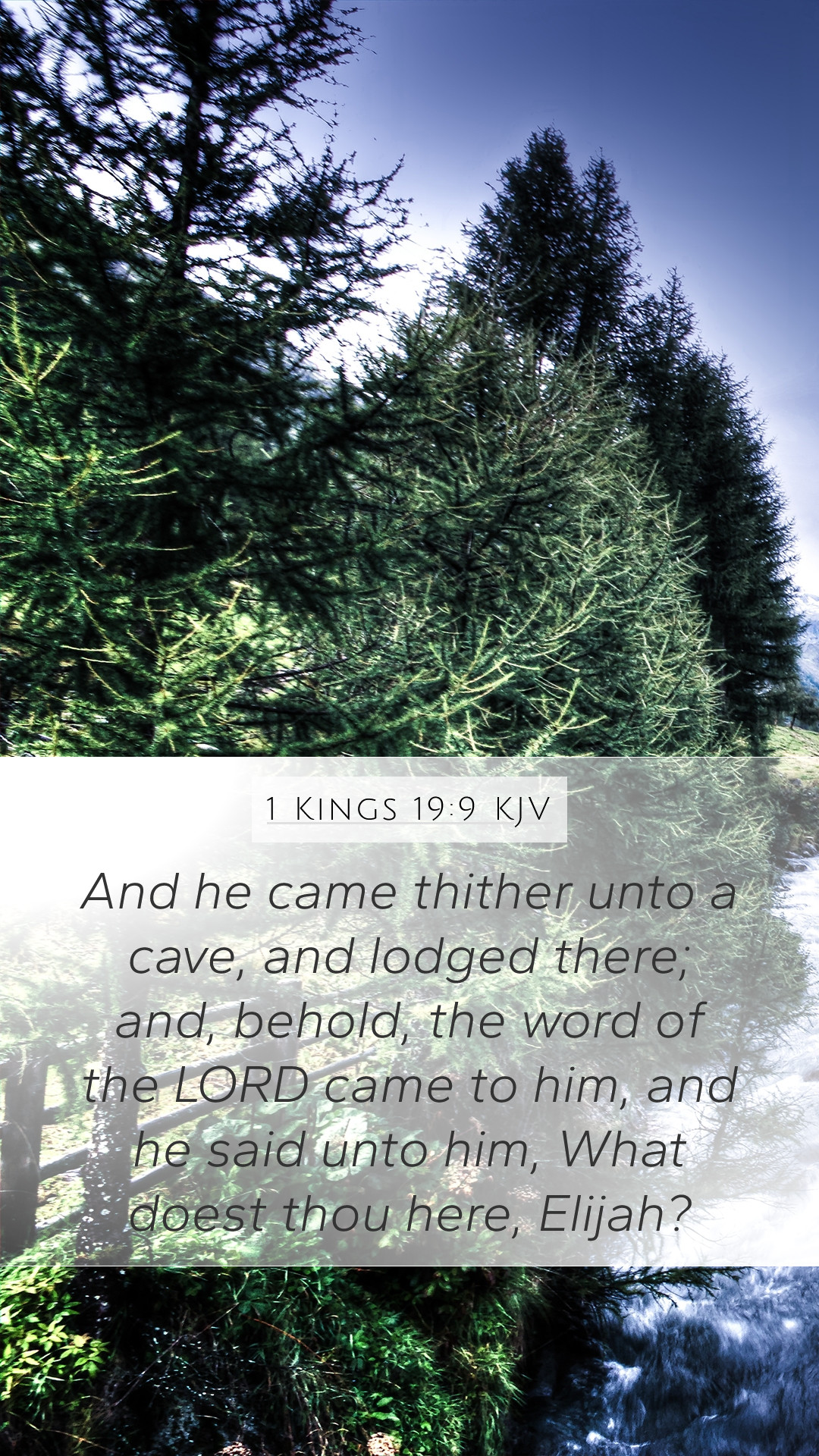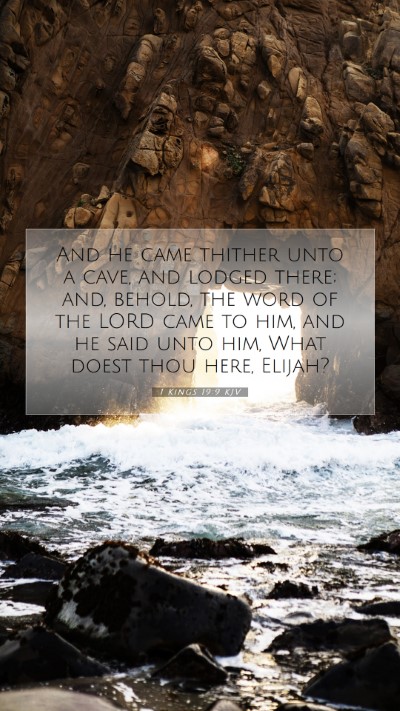Old Testament
Genesis Exodus Leviticus Numbers Deuteronomy Joshua Judges Ruth 1 Samuel 2 Samuel 1 Kings 2 Kings 1 Chronicles 2 Chronicles Ezra Nehemiah Esther Job Psalms Proverbs Ecclesiastes Song of Solomon Isaiah Jeremiah Lamentations Ezekiel Daniel Hosea Joel Amos Obadiah Jonah Micah Nahum Habakkuk Zephaniah Haggai Zechariah Malachi1 Kings 19:9 Meaning
What is the meaning of 1 Kings 19:9?
And he came thither unto a cave, and lodged there; and, behold, the word of the LORD came to him, and he said unto him, What doest thou here, Elijah?
1 Kings 19:9 Bible Verse Meaning
Understanding the Meaning of 1 Kings 19:9
Bible Verse: 1 Kings 19:9 - "And he came thither unto a cave, and lodged there; and, behold, the word of the LORD came to him, and he said unto him, What dost thou here, Elijah?"
Bible Verse Commentary
This passage occurs immediately after the profound events of Elijah’s confrontation with the prophets of Baal on Mount Carmel. The context reveals Elijah is fleeing from Queen Jezebel, who threatens his life. In this verse, we witness Elijah’s emotional and spiritual crisis. Public domain commentaries provide valuable insights into this verse, helping us to grasp its significance.
Insights from Commentaries
-
Matthew Henry:
Henry emphasizes the solitary condition of Elijah. He describes Elijah’s retreat into the cave not merely as a physical escape but as a reflection of his despair and feeling of abandonment in his mission. The cave symbolizes a state of isolation where he awaits divine communication.
-
Albert Barnes:
Barnes highlights the question God poses to Elijah, “What doest thou here?” as a means of self-reflection and a moment for Elijah to assess his circumstances. This inquiry points towards God’s readiness to engage His prophet and draw out Elijah’s understanding of his role and commitment to the Lord amidst peril.
-
Adam Clarke:
Clarke discusses the theological implications of God’s word coming to Elijah in his hiding place. God's questioning indicates a divine desire to reconnect with Elijah, serving as a reminder that even in our darkest moments, God seeks to draw us out from despair and redirect our purpose. Clarke also notes that God’s questions serve to both challenge and comfort the weary prophet.
Exploring the Themes
The themes of isolation, divine inquiry, and purpose are prominent in this verse:
- Isolation: Elijah’s retreat reflects a common human experience during times of fear and uncertainty. The verse highlights God’s recognition of our struggles and His invitation to come into His presence.
- Divine Inquiry: God's question serves as a catalyst for spiritual reflection. It challenges believers to analyze their own lives and consider whether they are fulfilling God's purpose.
- Purpose and Calling: This moment is pivotal for Elijah, as it leads to a renewed understanding of his mission. The journey of self-discovery is often facilitated by God's gentle questioning.
Bible Study Insights
This verse is a cornerstone for discussions in Bible study groups focusing on feelings of inadequacy, isolation, and the need for divine reassurance. It provides an excellent opportunity for online Bible study sessions that deal with understanding God’s communication in times of distress.
Additional References
- James 5:17 - "Elias was a man subject to like passions as we are, and he prayed earnestly that it might not rain: and it rained not on the earth by the space of three years and six months."
- 1 Kings 18:37 - "Hear me, O LORD, hear me, that this people may know that thou art the LORD God, and that thou hast turned their heart back again."
- Psalm 139:7-10 - "Whither shall I go from thy spirit? or whither shall I flee from thy presence?"
Applying the Understanding of this Verse
The verse encourages believers to recognize that God is always aware of our situations, even when we feel alone or discouraged. It invites reflection on our journey and urges us to seek clarity regarding our purpose within God's plan. For those wondering what does this specific Bible verse mean, it serves as a reminder that introspection is vital in our spiritual walk. As we explore in-depth Bible verse analysis, we can apply these lessons to our everyday lives, transferring Elijah’s experience into encouraging action in our ministries and personal spiritual journeys.


